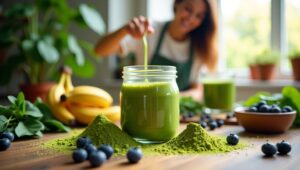With the arrival of December, the winter season has set in, and common ailments like coughs and colds prevent you from enjoying nature.
Medicines can ward off winter ailments, but our traditional spices are always healthy or great immune boosters and work their magic on the tongue in good-tasting doses.
These spices can enhance the flavour of our usual dishes, such as curries and legumes, and they can also enhance the flavour of sweet dishes.
During these winter months of December, January, and February, you should include these five herbs in your diet for good health.
Table of Contents
Togglelist of winter spices to help with colds and coughs
1. Turmeric
Turmeric, a prized ingredient in Indian cuisine, is a spice we can’t imagine our meals without. This makes our kitchen strong and different from the rest of the world. It is great for fighting coughs and colds, and thanks to the presence of its main ingredient, the powerful antioxidant curcumin, you should consume it daily to reap the best benefits of turmeric. Have some turmeric milk. It is easy to make and healthy to eat. Boil milk in a pan and add turmeric powder when it’s hot. Mix well until the turmeric is well incorporated into the milk. Warm it up before bed for a good night’s sleep, and wake up refreshed in the morning.
2. Cinnamon
Cinnamon is a delicious and aromatic spice derived from the inner bark of several species of the Canella tree. It is widely used in India as a traditional digestive and mouth freshener, but its antiviral properties also play a role in suppressing colds and coughs. A honey-flavouring cinnamon drink can be a great winter drink to drink before sleeping. To prepare the drink, boil two cups of water in a vessel and add one teaspoon of ground cinnamon to it. Cover the pan with a lid and cook for a few minutes. When the water becomes very cold, mix honey into it and drink it.
Read also: List of seasonal vegetables
3. Holy Basil
Holy basil, commonly known as Tulsi, is a sacred plant that holds a special place in every Indian home. According to Ayurveda, Tulsi is called the “Mother of Medicine” and the “Queen of Herbs.” Drinking a cup of Tulsi tea every morning provides relief from a cold, cough, and sore throat. To make tea, boil fresh basil leaves in two cups of water for 10–15 minutes. Strain the mixture, add lemon juice or honey, and drink hot.
4. Ginger
Ginger is a traditional herbal remedy and a common ingredient in cooking. Research has shown that ginger contains bioactive compounds that have anti-inflammatory properties and may control or reduce the risk of colds, coughs, and sore throats. Along with using it regularly in your diet, you can also drink a glass of ginger water daily. To make ginger water, grind 1.5 tablespoons of ginger and set aside. Bring 4 cups of water to a boil in a saucepan; add ginger and remove from heat. After soaking the ginger in hot water for 5–10 minutes, strain it and finally take out the ginger pieces. You can drink ginger water after it cools down. You can add honey to sweeten this bitter drink.
5. Cloves
Cloves are rich in anti-inflammatory compounds that help with sore throats, coughs, colds, and sinus infections. You can chew raw cloves, mix them in lukewarm water, and drink them early in the morning, or add them to a cup of tea. Many people use clove oil to clear a stuffy nose. Additionally, it has a cooling effect on the throat as well as the nasal cavity.
6. Black paper
Spiced garam masala is an absolute must in many winter foods and drinks. Black pepper is used in many Ayurvedic preparations for its healing effect on the throat. Black pepper is rich in nutrients like vitamin C, flavonoids, antioxidants, and antibacterial properties, all of which will do wonders for your immune system and keep coughs and colds at bay. Drinking a cup of black pepper tea or black pepper tea with honey in the morning can prevent a cold.









